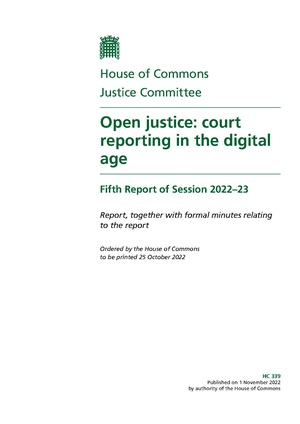House of Commons Justice Committee, 'Open justice: Court reporting in the digital age' (HC 339, 1/11/22)
Open justice "We launched this inquiry in September 2021 to consider two open justice issues. The first was how the changing nature of the media was affecting court reporting. The second was how the court reform programme was affecting the public and the media’s ability to access information on court proceedings. The unifying theme between the two issues is the increasing digitisation of both the courts and the media and the implications of this for the public’s ability to access information on court proceedings. The evidence submitted to this inquiry has suggested that open justice in England and Wales is facing an important turning point in its history. This jurisdiction has a tradition of open justice dating back centuries. However, the advent of the digital age has profoundly changed how information on court proceedings is accessed and communicated. Digitisation of the courts and the media presents opportunities and risks for open justice and raises fundamental questions over the correct balance between transparency and justice."
Official summary
Open justice is the principle that court proceedings are conducted in public. Open justice is being transformed by the digital age. This inquiry focused on how the digitisation of the courts and the media is changing the way in which the public access court proceedings. Open justice is a principle that defines how our legal system operates and is a core component of the rule of law. Despite the constitutional status of the principle, there are many legal and practical limitations on how the public and the media access court proceedings.
There has been a significant decline in coverage of the courts in the media, particularly in the local press. This is concerning as the media plays a vital role in communicating the work of the courts to the public. The digitisation of the media and the courts has been positive for some aspects of court reporting, for example by enabling reporters to follow proceedings remotely and to use social media to give live updates on cases.
Our report highlights evidence from journalists about the practical difficulties they encounter reporting on the courts. Journalists and members of the public often have to overcome significant barriers to identify, attend and follow court proceedings. Across the justice system there are additionally significant variations in the accessibility and quality of information available on ongoing court proceedings. Witnesses to the inquiry stressed that it is often very difficult to follow and report on proceedings without access to the documents submitted to the court by the parties. HMCTS has made some progress in this area, but overall we find that there is much more that could be done to ensure that the media and the public can access the information they need to follow court proceedings. We recommend that HMCTS develops a single digital portal which the media and the public can use to access information on court proceedings, court documents and other relevant information.
Court reform has led to some challenges for open justice. Online procedures introduced in the criminal and civil courts have been designed to increase efficiency but some have argued that they have had a negative impact on transparency. In particular, the Single Justice Procedure has long been criticised for being insufficiently transparent. We recommend that HMCTS should review the procedure and ensure that it is as transparent as proceedings in open court.
Finally, we support the work being done by the President of the Family Division, Sir Andrew MacFarlane, to enhance the transparency of the Family Court without compromising the confidentiality of the children involved. The Family Court now deals with a large volume of cases, which directly affects a significant number of families, and as a result the public has a legitimate interest in having a better understanding of how the Court works. We recommend that the legislative framework governing the reporting on family proceedings should be reviewed and reformed, as it is no longer fit for purpose. We look forward to seeing the results of the piloting of the changes recommended by the President of the Family Division’s Transparency Review. However, we stress that their success will depend on HMCTS providing sufficient resources to ensure that more information can be published on the work of the Family Court.
